Uncover Top Testosterone Killers Sabotaging Your Fitness Goals

Your hard work in the gym means nothing if hidden enemies are attacking your gains. Many everyday habits and foods act like silent saboteurs, slowly draining your energy and strength. We’re exposing the worst offenders so you can fight back.
Low hormone levels can sabotage muscle growth, fat loss, and stamina. Modern diets packed with processed foods and stress create a hormonal battlefield. But with the right intel, you can reclaim control.
This guide reveals the 11 biggest threats to your performance. From sneaky dietary traps to lifestyle choices that lower testosterone, we’ll help you build a stronger defense. Ready to lock and load?
Key Takeaways
- Hidden factors can secretly reduce your energy and strength.
- Processed foods and stress create a hormonal imbalance.
- Body fat plays a key role in hormone regulation.
- Simple lifestyle changes can boost performance.
- Knowledge is power-identify threats to take action.
Introduction: Understanding Testosterone and Its Importance

Your body's natural power source is under siege-and most men don't even realize it. Testosterone isn't just about muscles; it's the fuel for your entire physical operating system. This vital hormone builds bone density, powers recovery, and maintains your body's defense systems.
Think of your endocrine system as mission control. When hormone levels stay balanced, every metabolic process runs smoothly. But modern threats constantly hack this delicate system. Processed foods, chronic stress, and environmental toxins launch silent attacks that weaken your performance.
After age 35, men face a natural 1% annual decline in testosterone production. Yet today's lifestyle factors accelerate this drop like enemy forces breaching the gates. Your body tries to maintain balance, but it's fighting an uphill battle without proper intel.
Here's what's at stake when hormone levels dip:
- Muscle maintenance - Your body struggles to repair and build lean tissue
- Energy reserves - Fatigue sets in faster during workouts and daily tasks
- Metabolic health - Fat storage increases while calorie burning slows
We're exposing the hidden saboteurs so you can fortify your defenses. Knowledge is your first line of protection-arm yourself with it.
1. Soy Products: A Controversial Testosterone Killer
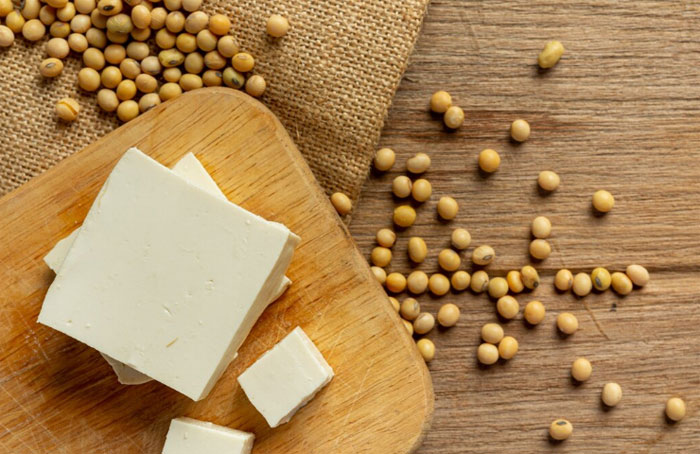
The soy debate rages on: friend or foe to your hormonal balance? While touted as a plant-based protein powerhouse, some soy products may quietly disrupt your body’s defenses. The culprit? Phytoestrogens, compounds that mimic estrogen and could interfere with hormone receptors.
The Phytoestrogen Debate
Phytoestrogens act like undercover agents in your system. They bind to estrogen receptors, potentially crowding out other hormones. But here’s the twist: research is divided. Some studies suggest minimal impact, while others report noticeable drops in testosterone levels.
"The 2021 meta-analysis of 38 studies found no significant hormonal disruption in men consuming soy."
Journal of Nutritional Science
What the Studies Say
Intel from the field is mixed. A 2005 study noted a 19% decrease in testosterone after 57 days of soy protein intake. Yet newer research contradicts these findings. Your mission: assess your personal tolerance before deploying soy as a dietary staple.
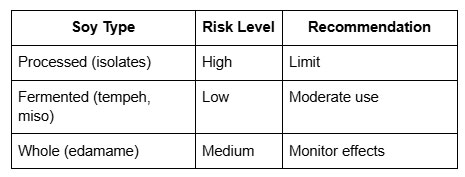
Field Strategy: Stick to fermented soy-it’s easier on your system. Avoid processed variants like protein powders until you’ve completed your personal "recon mission." Knowledge is your best armor.
2. Dairy: Hormones in Milk and Cheese
Your morning glass of milk might be a silent saboteur in your fitness mission. Commercial dairy operations often source milk from pregnant cows, delivering estrogenic payloads that disrupt your body’s hormonal command center. These compounds interfere with gonadotropin-releasing hormone (GnRH), a key player in maintaining optimal performance.
Here’s the intel: not all dairy is hostile. Grass-fed options provide cleaner reinforcements-packed with vitamin D and fewer hormonal risks. But standard supermarket varieties? They’re like double agents in your diet.
"Conventional dairy consumption correlates with altered hormone profiles in men, particularly when exceeding daily serving limits."
Nutrition Research Reviews
Field Strategy:
- Secure low-fat, grass-fed dairy-your safest ally.
- Engage ration control: limit to 1–2 servings daily.
- Deploy alternatives like almond or coconut milk for high-risk zones.
Arm yourself with knowledge. Your plate is a battlefield-choose your troops wisely.
3. Alcohol: The Testosterone Suppressant

That post-workout beer might be undoing your gains faster than you think. Alcohol isn’t just empty calories-it’s a testosterone suppressant that attacks your endocrine system like a covert operative. Even moderate drinking can weaken your hormonal defenses.
Short-Term vs. Long-Term Effects
One night of heavy drinking launches a scorched-earth campaign on your hormone production. Studies show acute intoxication lowers male hormone levels by 15% within hours. But the real danger? Chronic consumption. Over 30 days, heavy drinking destroys Leydig cells-your body’s T-production outposts.

Gender Differences
Here’s the intel: alcohol affects men and women differently. While male troops see hormone levels plummet after a 3-day binge, female recruits experience a temporary increase. Biology deploys different defenses-but neither side wins long-term.
"Men consuming 5+ weekly drinks show 12% lower testosterone than abstainers, while women’s levels rise 8% during intoxication."
Journal of Clinical Endocrinology
Field Strategy:
- Establish a 2-drink max with 48-hour recovery windows.
- Deploy liver reinforcements like NAC or milk thistle if alcohol contact is unavoidable.
- Monitor performance metrics-fatigue and slow recovery signal hormonal sabotage.
4. Baked Goods and Trans Fats

Your favorite breakfast pastry could be a stealthy enemy in your fitness mission. Commercial baked goods often contain trans fats-dangerous compounds that sabotage your testosterone levels while increasing body fat storage.
A 2017 study revealed men consuming trans fats had 15% lower hormone levels. These artificial fats create inflammation throughout your system, damaging cells that produce vital hormones. The FDA banned artificial trans fats in 2016, but they still lurk in many products.
Identify these hostile ingredients on labels:
- Partially hydrogenated oils (the main culprit)
- Margarine and vegetable shortening
- "Fractionated" or "interesterified" fats
"Trans fats disrupt cellular signaling pathways, directly impairing testicular function and hormone transport systems."
American Journal of Clinical Nutrition
Field Strategy: Build your own bakery station using clean ingredients:
- Almond or coconut flour instead of white flour
- Grass-fed butter or coconut oil for fats
- Natural sweeteners like monk fruit or stevia
Stay vigilant against snack bar ambushes. Pack olive oil packets or nuts for emergency rations instead of reaching for processed treats. Your hormones will thank you.
5. Sugar and Sugary Beverages
Sugar is the silent infiltrator in your diet, weakening your defenses when you least expect it. That momentary energy boost comes at a heavy price-your body responds to sweet assaults with hormonal chaos that lasts for hours.
The Insulin-Testosterone Connection
When sugar hits your system, it triggers an insulin spike that disrupts your endocrine supply lines. This emergency response diverts resources away from hormone production to manage the glucose flood. The result? Your natural testosterone output takes a direct hit.
Chronic sugar consumption leads to insulin resistance, creating a vicious cycle. Your pancreas works overtime while your hormone factories slow production. This double assault makes fat storage easier and muscle building harder.
Study Findings
Research reveals alarming data points:
- Men drinking sugary beverages have 59% higher risk of low hormone levels
- 25% drop in free testosterone within 60 minutes of consumption
- Effects persist for 2+ hours after sugar contact
"Every 50g of daily sugar intake correlates with 10% higher body fat percentage and measurable decreases in androgen levels."
Journal of Clinical Endocrinology & Metabolism
Field Strategy: Implement these countermeasures immediately:
- Replace soda with green tea or sparkling water outposts
- Approve only stevia and monk fruit for sweetener operations
- Conduct label reconnaissance-sugars hide in sauces and "healthy" snacks
- Maintain glucose patrols with protein/fiber at every meal
6. Mint: Peppermint and Spearmint

That refreshing mint tea might be weakening your frontline defenses without warning. Both peppermint and spearmint contain menthol compounds that could disrupt your body's natural hormone balance.
Animal studies reveal alarming data. Rats consuming spearmint tea for 30 days showed significant drops in testosterone levels. While human research remains limited, these findings suggest caution.
High-risk groups should be especially vigilant:
- PCOS patients may experience worsened symptoms
- Those with existing hormonal imbalances
- Athletes monitoring performance metrics
"Spearmint tea consumption in rats correlated with 23% lower androgen levels after one month of daily intake."
Medical News Today
Safer herbal alternatives exist:
- Ginger tea supports digestion without hormonal risks
- Hibiscus provides antioxidants and cardiovascular benefits
- Chamomile offers relaxation properties
Until more human studies emerge, consider mint a potential threat to your testosterone levels. Monitor your body's response if you choose to consume it regularly.
7. Vegetable Oils and Omega-6 Fatty Acids
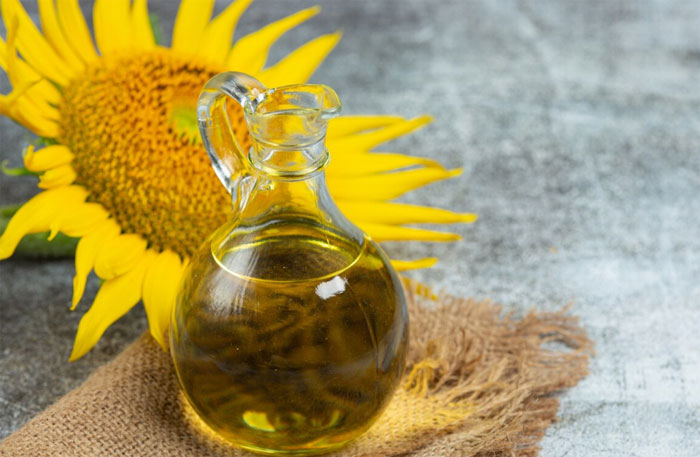
Your kitchen might be hiding enemy combatants in plain sight-common vegetable oils sabotaging your hormonal balance. These everyday cooking staples contain omega-6 fatty acids that can disrupt your body's natural defenses when consumed in excess.
The Omega-6 to Omega-3 Imbalance
Western diets deploy a dangerous 20:1 ratio of omega-6 to omega-3 fatty acids. This lopsided battlefield favors inflammation, while your ideal defense requires a balanced 1-2:1 ratio. Research confirms high omega-6 intake reduces testicular function and hormone production.
Hostile oils to identify and eliminate:
- Soybean oil-the top infiltrator in processed foods
- Corn oil-common in restaurant fryers
- Cottonseed oil-frequent snack food ingredient
- Sunflower oil-often marketed as "healthy"
"Industrial seed oils create inflammatory responses that impair hormone transport and cellular signaling systems."
Journal of Nutritional Biochemistry
Field Strategy: Secure your nutritional perimeter with these tactical moves:
- Replace all hostile oils with olive, avocado, or coconut oil
- Boost omega-3 reinforcements with wild salmon or algae supplements
- Conduct pantry sweeps-eliminate products with soybean or canola oil
- Maintain vigilance when dining out-request cooking oil specifications
Your cooking oil choice is frontline defense. Arm yourself with the right fats and watch your performance metrics improve across all fronts.
8. Nuts High in Polyunsaturated Fats
Not all nuts are created equal when it comes to supporting your hormonal defenses. Some varieties contain polyunsaturated fats that can interfere with your body's natural balance.
Walnuts and almonds operate like double agents-packed with nutrients but increasing SHBG proteins that lock up free hormones. Research shows these nuts may reduce available active hormones by 12-15% with regular consumption.
Your safer alternatives for testosterone production support:
- Brazil nuts - Selenium-rich commandos that boost antioxidant defenses
- Macadamias - MUFA-packed reinforcements that fight oxidative stress
- Pecans - Lower in problematic fats than walnut operatives
"Men consuming walnuts daily showed higher SHBG levels correlating with reduced bioavailable androgens in clinical observations."
Nutrition Journal
Field Strategy: Implement these protocols for nut consumption:
- Maintain 1-ounce daily rations (about 12 almonds or 6 Brazil nuts)
- Roast raw nuts yourself to avoid inflammatory oil coatings
- Pair with vitamin C sources to counter fat oxidation
Your snack strategy matters. Choose your nut reinforcements wisely to keep your hormonal defenses at peak readiness.
9. Flaxseed: A Double-Edged Sword
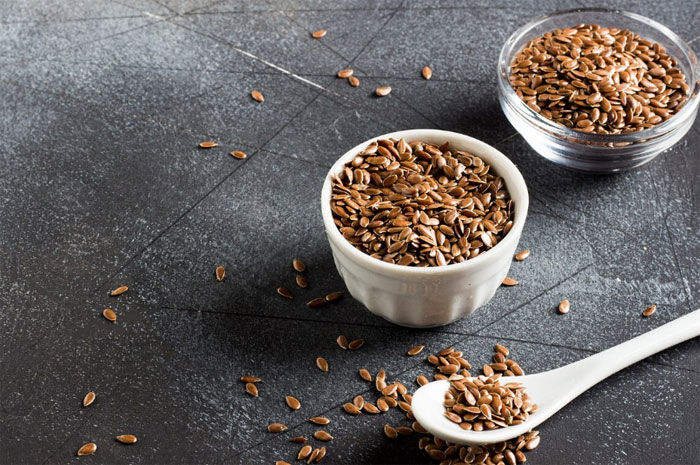
Flaxseed's golden glow hides a potential threat to your hormonal defenses. Marketed as a superfood, its lignans act like undercover operatives in your system. These plant compounds can bind to hormones, disrupting your natural balance.
A 2007 case study revealed alarming data. Women with PCOS consuming flaxseed daily saw significant drops in androgen levels. Male patients weren't safe either-a 2001 study showed reduced hormone activity in prostate cancer patients using flax supplements.
"Flaxseed intervention decreased serum testosterone concentrations by 15% in PCOS patients over 12 weeks."
Journal of Clinical Endocrinology
Here's how to navigate this nutritional minefield:
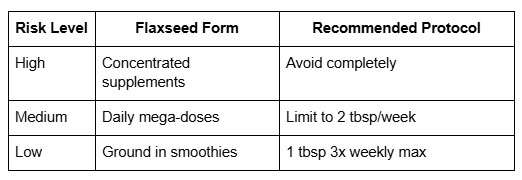
Your body will signal if flaxseed becomes a threat. Watch for energy dips or decreased performance. We recommend rotating with chia or hemp seeds for safer fiber options.
Arm yourself with knowledge. Flaxseed has benefits, but requires strategic deployment. Monitor your response like a soldier checks their gear-regularly and thoroughly.
10. Licorice Root: A Natural Testosterone Killer
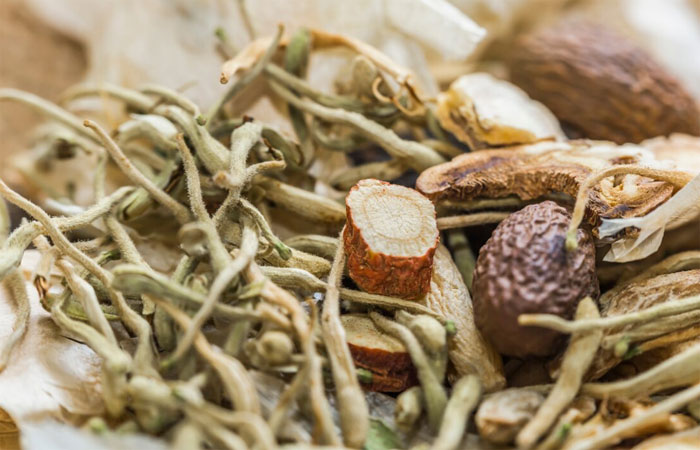
Licorice root operates like a stealth bomber against your hormonal defenses. This common herbal ingredient contains glycyrrhizin, a compound that disrupts your body's natural balance. Don't let its sweet taste fool you-it's a confirmed threat to peak performance.
Scientific reconnaissance reveals alarming data. Just 7g of licorice root daily lowered male hormone levels by 26% in one week. The compound works by suppressing adrenal production, cutting off a vital supply line for your endocrine system.
"Glycyrrhizic acid in licorice demonstrates clear anti-androgen activity, reducing serum testosterone concentrations in healthy men within days of consumption."
Journal of Clinical Endocrinology & Metabolism
Here's your tactical briefing on this hidden threat:
- Herbal tea ambush - Many "calming" blends contain licorice as a stealth ingredient
- Supplement sabotage - Some natural remedies use licorice as a base without proper warning
- Sweetener deception - Found in some "natural" candy and throat lozenges
Approved alternative sweeteners for your mission:
- Monk fruit extract (zero glycemic impact)
- Stevia (plant-based with no hormonal effects)
- Erythritol (safe sugar alcohol alternative)
Maintain constant vigilance when reviewing ingredient lists. Licorice root often deploys under aliases like "glycyrrhiza glabra" or "natural flavoring." Your hormonal defenses depend on this critical intel.
11. Lifestyle Factors That Lower Testosterone

Modern life deploys silent attacks against your natural energy systems every day. While diet grabs headlines, lifestyle factors like sleep deprivation, stress, and inactivity wage a covert war on your hormonal balance. We’re exposing these threats and arming you with countermeasures.
Poor Sleep Habits
Sleep deprivation launches night raids on your hormone production. Studies show
"Men averaging 4–5 hours nightly have significantly lower morning testosterone than those sleeping 7–9 hours."
Journal of the American Medical Association
Field Strategy: Implement the Oorah Sleep Protocol:
- Blackout conditions (no blue light 90 minutes pre-mission)
- 18–22°C room temperature for optimal recovery
- Magnesium artillery (400mg glycinate before deployment)
Chronic Stress
Cortisol insurgents hijack your hormone precursors, diverting resources to survival mode. Long-term stress forces your body to prioritize cortisol over other critical compounds. This leaves your system depleted and vulnerable.
High-risk zones include:
- 60-hour workweeks with no downtime
- Financial or relationship pressures
- Overtraining without recovery cycles
Counterattack: Deploy stress-resilience training-cold showers, box breathing, and adaptogens like ashwagandha.
Sedentary Lifestyle
Desk-bound positions enable adipose enemy forces to convert hormones into estrogen. Obesity increases this conversion by 40%, creating a vicious cycle. Your body needs movement to maintain hormonal supply lines.
Mission Critical:
- 10k daily steps (minimum patrol requirement)
- Resistance training ops 3x weekly
- Standing recon every 45 minutes
Your chair is a silent adversary. Treat it like one.
Conclusion: How to Combat Testosterone Killers
Your mission to reclaim peak performance starts with strategic countermeasures. The Mediterranean diet is your frontline defense-packed with olive oil, wild fish, and leafy greens to boost testosterone naturally. Pair this with resistance training ops like squats and deadlifts to trigger hormonal surges.
Deploy these tactical protocols:
Operation Hormone Shield: Secure zinc, vitamin D, and omega-3 reinforcements. These nutrients fortify your body’s production lines.
Clean Chow Protocol: Grass-fed meats and organic produce eliminate dietary saboteurs. Fermented foods like kimchi keep gut defenses strong.
Special Forces Training: Compound lifts and HIIT drills boost testosterone faster than solo missions. Sauna recovery ops enhance circulation.
Remember: You control 90% of factors influencing hormone balance. Stay vigilant with blood work intel and adjust tactics as needed. Victory requires full offensive engagement-now move out!
FAQ
Do soy products really lower hormone levels?
Research suggests phytoestrogens in soy may disrupt natural hormone balance, but moderate intake likely has minimal impact on healthy men.
How does alcohol affect male health?
Alcohol suppresses testosterone production, with chronic use showing greater negative effects than occasional consumption. The body prioritizes metabolizing alcohol over hormone production.
Are all dairy products bad for hormone health?
Conventional dairy may contain synthetic hormones. Opt for organic or grass-fed options, which typically have better fatty acid profiles and fewer additives.
Why are trans fats harmful to male wellness?
These artificial fats increase inflammation and body fat percentage while decreasing beneficial fatty acids - a triple threat to hormone function.
Can mint actually impact hormone levels?
Studies show spearmint and peppermint may have anti-androgenic effects, particularly when consumed in large quantities as tea or supplements.
What's the best way to balance omega fatty acids?
Reduce processed vegetable oils (high in omega-6) and increase omega-3 sources like wild-caught fish or algae supplements for optimal hormone support.
Does licorice root affect all men equally?
The glycyrrhizin in licorice can temporarily reduce hormone levels, with effects varying based on individual metabolism and consumption frequency.
How quickly can lifestyle changes improve hormone health?
Quality sleep, stress management, and resistance training can yield measurable improvements in as little as 4-6 weeks for many men.





